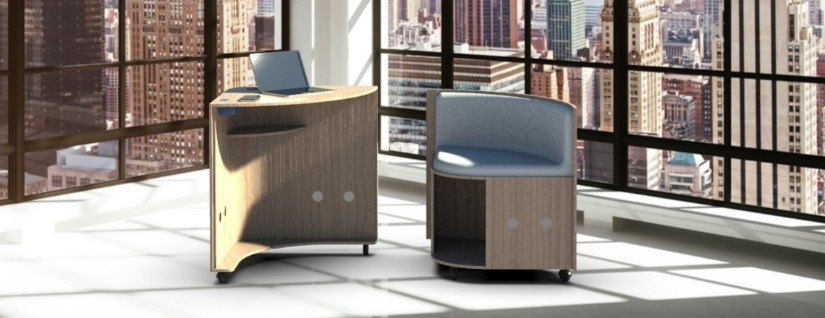
Three new graduates of OCAD University’s Industrial Design (ID) program have been recognized by the industry for their thoughtful approaches to developing innovative new products.
Rocket is an annual thesis project competition for Ontario’s graduating industrial designers held by the Association of Chartered Industrial Designers of Ontario (ACIDO). The OCAD U students competed against ID students from three other post-secondary schools in Ontario, and their successes led to OCAD U being the top-scoring school in the competition.
“We structure our program differently than other schools by focusing more on service and product design rather than just design for the manufacturing industry, and this resonated with the association,” says Angelika Seeschaaf Veres, chair of, and associate professor in the Industrial Design program.
Processing death
SingYu Lam scooped up the most awards, with the competition’s Market Research, User Experience, and Innovation awards for his project that supports constructive reflection on death and dying.
Frame is a physical and digital experience that provides a secular framework for coming to terms with our inevitable demise. The central question driving his research is: “What if there was a way to make thinking about dying a positive and natural part of living?”
Lam researched the topic extensively, conducting a preliminary survey to gauge public attitudes about death—60 per cent don’t think of it often—examining the scientific literature on death reflection and interviewing palliative care physicians, hospice nurses and other experts.
A few rounds of ideation were followed by prototyping of a meditation app that suggests various death contemplation exercises. He developed an accompanying counting pebble device that helps focus attention during meditation.
“He is asking people to observe our usual behaviours around death, and to consider creating new rituals that speak to millennials in a contemporary way,” Veres says.
Cooperative career planning
Claire Wu would like to help second-generation Chinese-Canadian high school students and their Chinese-immigrant parents find common ground on career planning.
Her LinkedIn Role Model is a learning platform designed to be integrated into Ontario’s mandatory Grade 10 Career Studies course. Wu developed it by conducting expert interviews to identify the common tensions that arise when the aspirations of parents don’t match with their kids’ dreams. She also read journal articles and conducted market research. She then connected with the York District School Board to have Gr. 10 students test it.
The resulting platform features three modules that a parent and child complete, including a printable game to play that focuses on understanding both parties’ core values surrounding an ideal career. The process concludes with browsing a specialized database of industry professionals on LinkedIn.

Future workstations
With co-working spaces on the rise, Reid Howe envisions a way for us to have a personal space within a communal work environment.
His Open Space concept includes a completely mobile personal workspace he has dubbed Quarter that features seating, a desk and storage. It also includes a 400-watt power bank for charging a laptop, the ability to lock it with a cellphone, to keep belongings safe during a coffee or bathroom break.
Reid says Open Space allows users to choose when and how they work in a co-working space.
“We have the opportunity to transform co-working spaces into places where users can create their own personal space to work instantly while still being part of the greater community that exists,” he writes about his project. “We no longer have to sit in compliance with what is, but create what we wish to be.”
